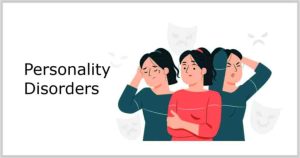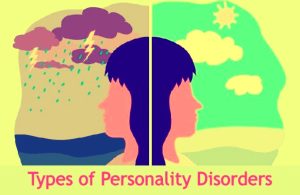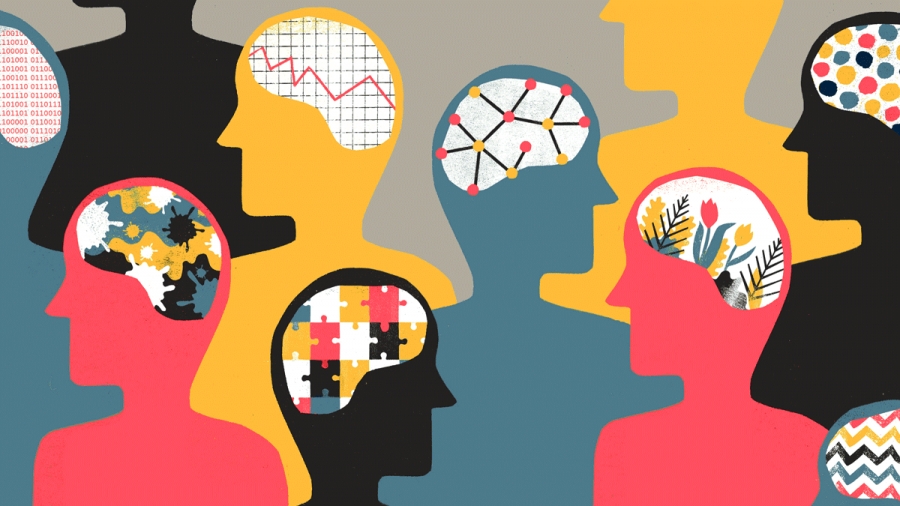There are many different types of personality disorders, and each one can affect people in different ways. Some of the most common personality disorders include antisocial personality disorder, borderline personality disorder, narcissistic personality disorder, and histrionic personality disorder.
Contents
- 1 What Are Personality Disorders?
- 2 Types Of Personality Disorder
- 3 Symptoms Of Different Types Of Personality Disorder
- 4 How Common Are Personality Disorders?
- 5 Treatment Of Different Types Of Personality Disorder
- 6 How To Deal With People Who Have Personality Disorders?
- 7 Conclusion
- 8 A Word From Therapy Mantra
What Are Personality Disorders?

Personality disorders are mental health conditions that affect how someone thinks, feels, and behaves. There are many different types of personality disorders, and each one can affect people in different ways.
People with personality disorders often have difficult relationships with other people and may struggle to hold down a job or maintain healthy relationships. They may also experience a wide range of emotions, which can be difficult to manage.
There is no one-size-fits-all treatment for personality disorders, but therapy and medication can be effective in managing them. It is important for people with personality disorders to seek help from a healthcare professional if they are struggling to cope.
Types Of Personality Disorder

There are many different types of personality disorders, and each one can affect people in different ways. Some of the most common personality disorders include antisocial personality disorder, borderline personality disorder, narcissistic personality disorder, and histrionic personality disorder.
People with an antisocial personality disorder often have a disregard for law and social norms. They may be manipulative or aggressive, and often have no regard for the feelings of others. They may also engage in criminal behavior.
Borderline Personality Disorder
A borderline personality disorder is a condition that is characterized by emotional instability. People with this disorder may experience intense mood swings and may be prone to self-harm or suicidal thoughts. They may also have difficulty maintaining relationships.
Narcissistic Personality Disorder
People with narcissistic personality disorder have an inflated sense of their own importance and a strong need for attention and admiration. They may be preoccupied with grandiose fantasies, believe that they are superior to others, and have little regard for the feelings of other people.
Histrionic Personality Disorder
People with histrionic personality disorder tend to seek out situations where they will be the center of attention. They crave stimulation and excitement but often feel bored easily. They may be flirtatious or seductive in order to get this attention from others, which can lead to problems in relationships.
Obsessive Compulsivity Personality Disorder

This is one of the types of personality disorders that are preoccupied with thoughts that do not relate to reality. They may be inflexible and detail-oriented or perfectionistic, rigid in nature, and unable to consider other people’s views.
These are the main types of personality disorders. Each type is characterized by different traits which can lead to intense emotions throughout life. The best thing people with these disorders can do is reach out for help from professionals who understand the struggles they are going through. With any luck, it won’t be long before better treatments are discovered for each condition.
Dependent Personality Disorder
People with dependent personality disorder are unwilling to make their own decisions. They may become passive and allow others to assume responsibility for major areas of their life, or they may find it difficult to express disagreement or initiate projects without encouragement. They may also be excessively clingy in relationships.
Avoidant Personality Disorder
People with avoidant personality disorder tend to believe that they are socially inept and inferior compared with other people. As a result, they often lack self-confidence and avoid social situations. People with this type of personality disorder might approach new situations cautiously, but only because of how anxious these events make them feel rather than because they actually fear them.
Symptoms Of Different Types Of Personality Disorder

People with personality disorders may experience a wide range of symptoms, which can vary depending on the types of personality disorders. The most common symptoms include:
1. Difficulty managing emotions. People with personality disorders may find it difficult to control their emotions and may experience intense or frequent mood swings.
2. Trouble relating to others. People with personality disorders may have difficulty forming relationships with others and may struggle to understand social cues. They may also appear uninterested in social activities.
3. Impulsive behavior. People with personality disorders may act on impulse without thinking about the consequences, which can often lead to problems such as addictions, financial instability, and dangerous behaviors.
4. Extremely sensitive egos. People with personality disorders often have very sensitive egos, which can lead to problems such as hypersensitivity and a tendency to take things very personally.
5. Unreliability. People with personality disorders often find it difficult to keep up their end of the bargain and may be unreliable in both their professional and personal relationships.
6. Social isolation. Many people with personality disorders tend to withdraw from others, especially those who know them well enough to identify their symptoms – they may spend more time alone or associate only with a select group of people whom they feel comfortable around.
7. Excessive fear / anxiety / guilt / shame / sadness etc. People with personality disorders are often prone to experiencing intense emotions, particularly those related to fear, anxiety, guilt, shame, and sadness – this is exacerbated by the fact that they often feel socially isolated.
8. Difficulty adapting to change. People with personality disorders may have difficulty adapting to change, which can make it difficult for them to handle the normal stresses of life (such as changing jobs or moving house).
9. Tendency towards depression / suicidal thoughts/self-harm etc. Many people with personality disorders are known to experience symptoms of depression or consider harming themselves or committing suicide – this warning sign should not be taken lightly and if you suspect someone is having these thoughts, seek professional help immediately.
10. Paranoia / extreme mistrust of others. While many people with personality disorders tend to withdraw from others, some people may become increasingly paranoid about the actions and motives of other people – this can cause them to lash out against those around them and/or push people away.
11. Inability to see own personality disorder. It is a common symptom of personality disorders for the person to be unaware that they have a problem – it may be helpful to point out to them some of the warning signs listed above, but always remember not to make any promises you can’t keep or attack them or accuse them of being ‘crazy’ or ‘insane’ – again, this will only lead to disappointment on both sides.
How Common Are Personality Disorders?

Personality disorders affect about 9.1 percent of adults in the United States. People with personality disorders often have difficult relationships with other people and may struggle to hold down a job or maintain healthy relationships.
People with personality disorders typically behave differently than others do. They may struggle to feel empathy or be able to connect emotionally with other people – this can make it hard for them to form meaningful relationships. People with these disorders may also have intense emotional states that they find difficult to manage.
Treatment Of Different Types Of Personality Disorder

There is no one-size-fits-all treatment for personality disorders, but therapy and medication can be effective in managing them. A type of therapy called cognitive-behavioral therapy (CBT) may help some people manage their symptoms, and a combination of psychotherapy and pharmacotherapy is often used to treat more severe personality disorders.
It is important for people with personality disorders to seek help from a healthcare professional if they are struggling to cope. Living with these types of mental health conditions can be challenging but it’s possible – with the right treatment – to live a healthier, happier life.
Medication-based treatments can be really effective in treating personality disorders. For example, antidepressants are often used to treat people with narcissistic personality disorder. Because they can help ease symptoms of depression and anxiety which often co-occur with this condition. Mood stabilizers or atypical antipsychotics may also be helpful if your loved one is experiencing mood swings or has difficulty controlling their emotions.
How To Deal With People Who Have Personality Disorders?

There is no one-size-fits-all approach to managing personality disorders, as the treatment required will vary depending on the type of disorder. However, there are some general tips that can be useful for managing any type of personality disorder:
1. Be patient and understanding. Personality disorders can be difficult to manage, and the person with the disorder may not always be willing or able to comply with treatment. That is why It is important to be patient and understanding and to keep in mind that progress may be slow.
2. Establish clear boundaries. People with personality disorders can often be very demanding and pushy and may try to take advantage of others. It is important to set clear boundaries and let the person know what you will and will not do.
3. Offer consistent praise and rewards for good behavior. Because the person with the personality disorder may need ongoing encouragement and support. And positive reinforcement can increase the chances that they will continue treatment/make progress in therapy. Also, be sure to reward good behavior consistently, and avoid giving attention to bad behavior as this is only likely to reinforce it.
4. Keep track of any commitments you have made. In many cases, people with personality disorders have a poor sense of responsibility. So it is important to keep track of any promises that have been made to you or agreements that have been entered into. This should also apply where money is concerned. Be careful not to lend or give them any money as they are unlikely to repay it.
5. Don’t take responsibility for the actions of the person with the personality disorder. People with personality disorders are often oversensitive. So they may take offense at any comments that are made about them to other people, including family members and close friends. Therefore you have to be firm in what you say (avoiding judgmental language). But also be sure not to make any promises or commitments you can’t keep. Because this will only lead to disappointment on both sides.
6. Seek professional help if necessary. It is important to remember that managing a person with a personality disorder can be very difficult and tiring. Particularly if there are behaviors that pose risks to others (such as aggression or violence). If you feel like you need some extra support, it may be best to contact a professional counselor who will be able to provide help and advice.
Conclusion
Personality disorders are a type of mental disorder that can cause a person to have trouble with how they think, feel, and behave. And there are many different types of personality disorders, each with its own unique symptoms and characteristics. Although some people may only experience a few mild symptoms, others may struggle greatly with everyday life tasks. So if you think you or someone you know may be struggling with a personality disorder. It is important to seek professional help as soon as possible. Treatment for personality disorders can be very effective when sought early on. So don’t hesitate to get help if you feel like you’re not coping well.
A Word From Therapy Mantra
Your mental health — Your psychological, emotional, and social well-being — has an impact on every aspect of your life. Positive mental health essentially allows you to effectively deal with life’s everyday challenges.
At TherapyMantra, we have a team of therapists who provide affordable online therapy to assist you with issues such as depression, anxiety, stress, workplace Issues, addiction, relationship, OCD, LGBTQ, and PTSD. You can book a free therapy or download our free Android or iOS app.


